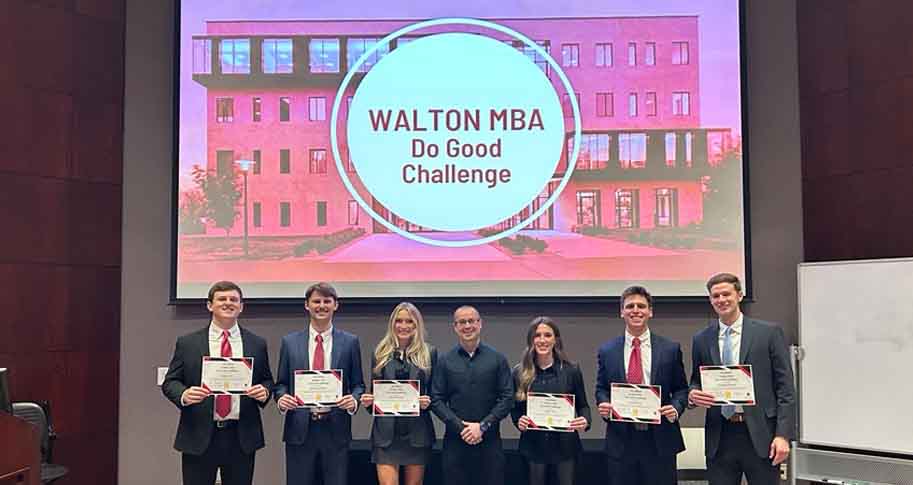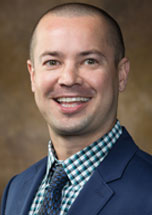
“Do all the good you can, By all the means you can,
In all the ways you can, In all the places you can,
At all the times you can, To all the people you can,
As long as ever you can.”
- John Wesley
There is perhaps no greater lesson for business students to learn than the realization that they hold an incredible power—the power to make the world a better place. At its core, this is what business ethics is all about: choosing the path that is right and good.
In the Walton MBA program, students are given an opportunity to experience this lesson first-hand. The Walton MBA Do Good Project offers immersive, experiential learning that bridges the gap between academic theory and practical application. It also plays a pivotal role in making students more competitive in the job market and more equipped to hit the ground running in their careers.
The Value of Experiential Group Learning
In designing the approach for the Walton College Business Integrity Leadership Initiative, we knew it had to be hands-on and practical to reap the greatest learning outcomes for our students. It’s common for business students to discuss ethical theories and principles, work through case studies and hypothetical ethical dilemmas, or even hear organizational leaders speak about overcoming ethical challenges in their careers or otherwise using their power for good.
What is much less common and far more meaningful, is for students to have an opportunity to bring their knowledge of business and ethics to life in a way that makes a real positive impact on others.
Experiential learning makes space for students to take charge of their own learning. It prepares students for the complexities they will inevitably face in the professional world. By actively engaging in real-world problem-solving scenarios, students gain valuable hands-on experience, develop critical thinking skills, and enhance essential soft skills, such as adaptability and effective communication.
This is especially true in the realm of ethics, where we know that the best way to teach isn’t by asking someone how they would act in a certain situation. Rather, the best way to teach ethics is to put someone in a situation and ask them to act.
The experiential learning process is strengthened further when students work together in groups. Working in a group setting enhances students’ teamwork, leadership, collaboration, problem-solving, perspective-taking, influence, and decision-making skills. The diverse perspectives present within a group also foster creativity and innovation as students are exposed to new ideas and ways of thinking.
Experiential group learning also gives students concrete project management experience, including managing their time, delegating tasks, handling conflicts, and communicating effectively. All these skills are crucial to success in the workplace today.
Incorporating the experiential group learning component at the MBA level also draws on the highest level of thinking in Bloom's Taxonomy - the "create" level. This level of cognitive processing is critical in higher education because it pushes students beyond understanding or applying knowledge to synthesizing information and generating original concepts or solutions.
The Walton College MBA Do Good Project
The Walton MBA Do Good Project is a semester-long experiential group learning project that requires students to engage in an elevated level of thinking. Initially developed by Georgetown professor Jason Brennan, the project integrates ethical principles into strategic decision-making.
For the past three years, the project has been part of the Walton MBA Leadership and Ethics course. At the start of the semester, groups of second-year MBA students are asked to think of something good to do to make the world a better place and then go do it. Students are given radical autonomy to determine what “do good” project they want to tackle. It can be a for-profit business, a nonprofit business, or a one-time project. The budget for each group is $1,000.
The Do Good project is funded and supported by the Walton College Business Integrity Leadership Initiative. The project is made possible through the generous donations of contributors to the Initiative who understand the importance of thinking beyond the bottom line.
The Initiative’s External Advisory Board, comprised of senior global business leaders, supports the project during the semester. The students meet with these leaders for advice, mentoring, and networking. This connection to real-world leaders provides the students with the opportunity to communicate their ideas concisely, gain input on how to improve their projects, and gather information about roadblocks they may encounter with ideas on how to overcome them.
At the end of the semester, another connection point with business leaders is created. The students present their projects to a panel of judges consisting of leaders who are Walton College MBA alumni and other community leaders. The judges choose a winning team based on a set of assessment questions to determine which team delivered the largest real-world impact. The winning team is awarded an additional $1,000 that goes toward furthering their winning idea.
After three years, Walton College MBA students have completed twenty-five Do Good Projects. The projects have ranged from for-profit ventures (e.g., Montay Coffee, which sources high-quality coffee from Haiti for sale in the U.S.) to social/NGO projects (e.g., Patchwork & Co. that partners with companies to repurpose wasted clothing items into reusable materials to minimize the physical waste in the environment), to educational endeavors (e.g., Pages with a Purpose that encourages childhood literacy by giving third-graders the opportunity to publish a hardback book that they write and illustrate themselves, with funding in future years secured through a local bank.)
Assessment and Long-Term Benefits
The assessment of each project requires the students to reflect on their experience during their final presentation by answering certain questions, including:
- How the team interpreted the imperative to do something good
- What the team’s opportunity costs were
- How the team allocated the division of labor
- What obstacles they expected, what they encountered, and how they responded
- Whether they added value to the world, considering their costs (time, effort, and money spent)
- What they learned and what they would have done differently if anything.
While only one team wins the competition at the end of the semester, all the students are “winners” because of the new skills they develop during the process. They learn to think critically and innovatively, to question existing paradigms, and to push the boundaries of their understanding. Even if their project technically fails because of a roadblock, it is not truly a failure. Learning still occurred. And as all seasoned business leaders know, learning from failure and failing fast is just as important, if not more so, than succeeding on every project.
Prepared for the Real World
The Walton MBA Do Good project stimulates the students’ intellectual growth and better prepares them for real-world business scenarios where innovation and creativity are highly valued. It also fosters a strong connection between the university and the business community in a way that benefits both.
The project highlights our students’ entrepreneurial and enterprising abilities and shows that within one semester - with a little money and some high-level direction - they can accomplish a tremendous amount of good all on their own.







